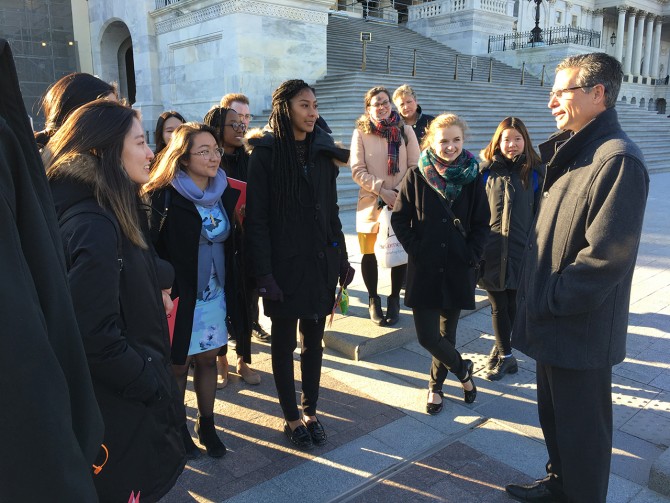Students travel to D.C. to advocate for federal financial aid
By Rachel Rhodes
Nineteen Cornell students representing 13 U.S. states traveled to Washington, D.C., March 6 for the annual Student Aid Advocacy Day, where they spoke with Congress members and staff about their experiences with federal financial aid and advocated for continued support of these programs.
The students visited the offices of 30 representatives and senators, including New York Sens. Chuck Schumer and Kirsten Gillibrand, New Jersey Sen. Cory Booker, Minnesota Sen. Amy Klobuchar, Washington Sen. Patty Murray and the offices of House representatives from the students’ home districts.
When meeting with staff and members of Congress, the students – who all receive some form of federal financial aid – shared their perspectives and urged policymakers to support financial aid.
“Financial aid was a huge part of applying to college,” La’Treil Allen ’22, a government major, told staff in the office of Rep. Peter Visclosky (D-Indiana), his hometown congressional representative. “Being a first-generation college student, it wasn’t clear what it meant to be financially secure, and financial aid – like the Pell Grant – made it possible for me.”
A Pell Grant is money the government provides for students who need it to pay for college. Grants, unlike loans, do not have to be repaid. Eligible students receive a specified amount each year under this program; in 2018-19, the maximum amount is $6,095.
The Higher Education Act – legislation governing the majority of federal student aid programs – is expected to be considered for reauthorization later this year. Past proposals for reauthorization have included the elimination of the Supplemental Education Opportunity Grant program, limitation on total Pell Grant funding, and phasing out of all current student loan repayment plans, including the Public Service Loan Forgiveness program.
Threats to these programs are what drove Lizzie Lee ’20 to participate in Student Aid Advocacy Day. Said Lee, a government major concentrating in political theory: “Beyond traditional financial aid, programs for federal work study and the Supplemental Education Opportunity Grant are incredibly important for the financial security of students. We’re concerned about funding and also changes that might limit student eligibility for these programs.”
Gloria Lee ’20 visited the office of Rep. Max Rose (D-N.Y.), her hometown congressional representative. “I gained so many valuable things through my education at Cornell that would not have been possible without federal student aid,” she said. “Education is such a vital part of society and financial aid helps make that achievable.”
Students also spoke with Elizabeth Falcone ’06, legislative director for Sen. Mark Warner (D-Va.).
“Cornell is a special place,” Falcone said. “I was drawn to Cornell because of its role in D.C. and the transformative program at Cornell in Washington. Cornell provided me with a great education and helped me figure out what would be meaningful work, which has been working in public service.”
The group concluded the day on the steps of the Capitol, where they met Rep. Dan Meuser ’88, a Republican from Pennsylvania, who was elected in 2018. Meuser serves on the Committee on Education and Labor, which oversees the Higher Education Act, and spoke with students about his role in continuing to make financial aid accessible.
Rachel Rhodes is a public affairs and media relations specialist in Cornell’s Washington, D.C. office.
Media Contact
Get Cornell news delivered right to your inbox.
Subscribe

